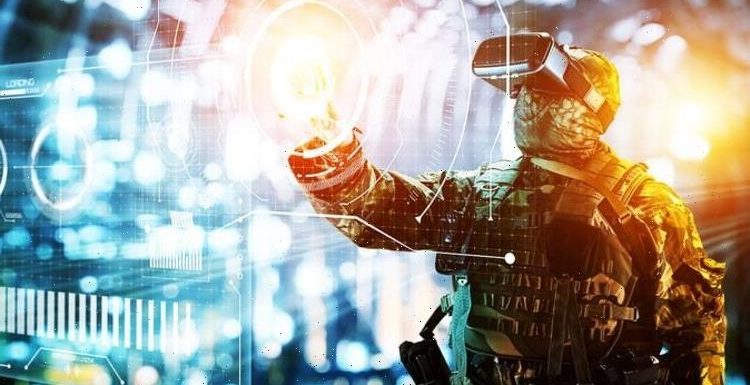
BBC explains what the meta-verse is
We use your sign-up to provide content in ways you’ve consented to and to improve our understanding of you. This may include adverts from us and 3rd parties based on our understanding. You can unsubscribe at any time. More info
To someone unfamiliar with the technology, the metaverse might look like Virtuality Reality (VR) version 2.0 — but it is much more. The metaverse goes further, allowing users — people like you — the ability to interact with and speak to people thousands of miles away, all from the comfort of your sofa. Some Artificial Intelligence (AI) and spatial computing experts like Professor David Reid go as far as to claim that the metaverse is the next evolutionary step of the internet — and potentially humankind.
The Associate Professor from Liverpool Hope University has been working on new types of technology to supplement users’ experience of the metaverse, like a glove installed with sensors that will allow you to feel and sense things in the virtual world in real life, in real time.
The metaverse essentially works like a computer, but rather than sitting at your desk and logging on to your laptop, you can pop a headset on and be dropped into the world on the other side of the screen.
Unlike current VR which is mostly used for gaming, this new virtual world can be used for anything, from work, leisure, concerts and cinema trips, or simply socialising with friends on the other side of the world.
Professor Reid describes the stage the metaverse is currently in as the “Wild West” — a place in its initial phases and has yet to be mastered by its creators or users, with still no one single definition of “metaverse” agreed on.


Looking to the future, he says there is an absolute universe of potentialities for the metaverse, both good and bad.
He told Express.co.uk about one potential danger of the metaverse: enemy states using the virtual world to target each other, directing attacks not at physical troops and borders, but biometric data and financial information, creating a new kind of cyberwarfare.
He noted that, much like the way the internet is employed in different countries today, the metaverse will split into a “western metaverse and a Chinese metaverse”.
Today, China uses what has been described as its “Great Firewall” to block out and censor information readily available to people in other parts of the world.
Asked whether he believed things like hybrid warfare seen between Russia and Ukraine in recent months could be transferred to the metaverse, he said: “It won’t just be transferred, it will become far more important.
“The amount of information you’re giving away, some of the core infrastructures for how our societies work, will all be available in the metaverse.
JUST IN: Xi Jinping provides lifeline to Putin with 30-year gas deal

“Getting control over that, if you’re in a cyberwarfare situation, will be strategically important.
“At the moment, the way we talk about cyberwarfare, I see it as being elevated massively in the future in the metaverse.
“And also criminalisation — things like Dark Web, because the metaverse is going to be built on non-fungible tokens (NFTs) and blockchain — and we all know who uses that.”
Prof Reid was referring to the many criminals who use the Dark Web and blockchain in order to leave no trace of their sales and purchases, although it is worth noting that not everyone who uses the Dark Web does so for illegal purposes.
He added that, while he believes there will be separate “western and Chinese metaverse”, eventually, he says the technology will become uniform.
DONT MISS
Scam warning issued as fraudsters target gamers [REPORT]
Putin’s plan to STARVE Britons backfires as backup stocks built up [INSIGHT]
Putin’s nuclear threat to UK: Nine locations that could be obliterated [ANALYSIS]

![]()
Many say the metaverse is simply hype; a trend that will fade away just like its predecessors.
But there is a huge excitement about the new technology among wealthy investors and big technology firms.
No one wants to be left behind in the early stages, which is contributing to an environment of massive investment which is in turn enabling rapid development.
Big companies and wealthy individuals are already pumping their physical cash into something called ‘Decentraland’ in the metaverse.

A 3D virtual world, users may buy virtual plots of land in the platform as NFTs via the MANA cryptocurrency.
In November last year, a plot of “land” was sold for €2.1million (£1.7million), obliterating the previous record of €810,000 (£675,000).
Decentraland will this year welcome the world’s first digital embassy after the Barbados government signed an agreement to house their official office on a patch of Decentraland’s virtual land.
This week, the metaverse came under renewed scrutiny after the NSPCC described the virtual world as “dangerous by design”.

The outfit was responding to an investigation by the BBC which found widespread child grooming, sexual material, racist insults and a rape threat in the metaverse.
In the virtual world, children mix freely with adults, which has led to many investigations finding adult users approaching children — identified by their real voices — and telling them to do inappropriate things.
Some companies who are pioneering the metaverse, like Meta, formerly Facebook, have introduced distancing between users in the virtual world, equivalent to four feet, in order to prevent users from carrying out explicit or hurtful acts on others.
Source: Read Full Article